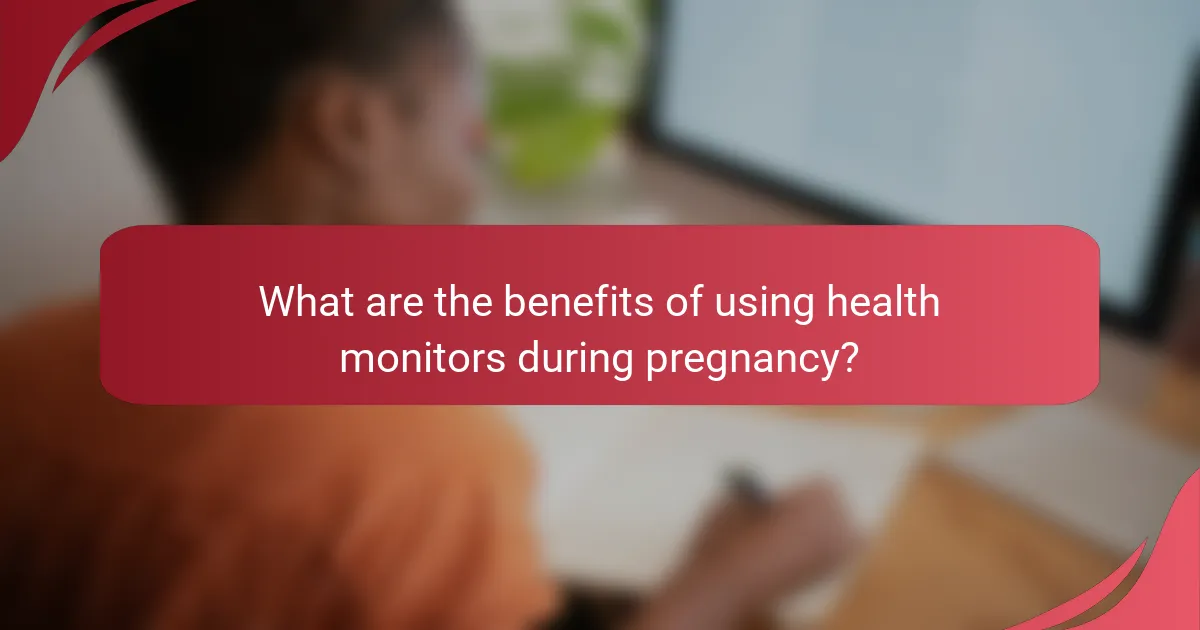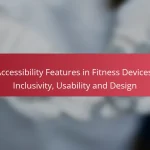Health monitors for pregnancy play a crucial role in ensuring the well-being of both mother and baby by tracking vital signs and providing real-time data. Essential features include accurate fetal heart rate monitoring, ease of use, and compatibility with mobile devices, allowing for timely interventions when necessary. With options like fetal Dopplers and wearable devices, these monitors enhance safety and support a healthy pregnancy journey.

What are the best health monitors for pregnancy?
The best health monitors for pregnancy include devices that track fetal heart rate, maternal health, and overall well-being. Key options are fetal Dopplers, smartphone-connected monitors, wearable devices, home ultrasound devices, and blood pressure monitors, each offering unique features and benefits.
Fetal Dopplers
Fetal Dopplers are handheld devices that allow expectant parents to listen to their baby’s heartbeat. They work by emitting ultrasound waves that reflect off the fetal heart, providing real-time audio feedback.
When selecting a fetal Doppler, consider ease of use, battery life, and sound quality. Many models are available for home use, but it’s essential to follow guidelines to avoid excessive use, which may cause unnecessary anxiety.
Smartphone-connected monitors
Smartphone-connected monitors sync with mobile apps to provide data on fetal heart rate and maternal health metrics. These devices often offer additional features like tracking contractions and providing educational resources.
When choosing a smartphone-connected monitor, look for compatibility with your device, user-friendly interfaces, and reliable data security. Ensure the app is well-reviewed and regularly updated for optimal performance.
Wearable devices
Wearable devices, such as smartwatches or fitness trackers, can monitor vital signs like heart rate and activity levels during pregnancy. Some models are specifically designed for expectant mothers, offering features tailored to their needs.
Consider wearables that provide accurate health data, long battery life, and comfort. Look for options that integrate with other health apps for a comprehensive view of your wellness throughout pregnancy.
Home ultrasound devices
Home ultrasound devices allow parents to visualize their baby through ultrasound imaging. These devices can provide reassurance and help monitor fetal development, although they are not a substitute for professional medical assessments.
When using a home ultrasound device, ensure it complies with safety regulations and is easy to operate. Limit usage to recommended frequencies to avoid potential risks associated with excessive ultrasound exposure.
Blood pressure monitors
Blood pressure monitors are crucial for tracking maternal health during pregnancy, as high blood pressure can lead to complications. Automated monitors are user-friendly and provide quick readings.
Choose a blood pressure monitor that is clinically validated for accuracy and fits comfortably on your arm. Regular monitoring can help detect issues early, so consider keeping a log of your readings to share with your healthcare provider.

How do health monitors ensure safety during pregnancy?
Health monitors enhance safety during pregnancy by providing real-time data on the mother’s and baby’s health, enabling timely interventions. These devices are designed to track vital signs and other important metrics, ensuring both the mother and fetus remain healthy throughout the pregnancy.
FDA-approved devices
FDA-approved health monitors are rigorously tested for safety and efficacy before they reach the market. These devices must meet strict regulatory standards, ensuring they provide accurate readings and do not pose risks to the mother or baby. Examples include fetal heart rate monitors and glucose meters, which are commonly used during pregnancy.
When selecting a health monitor, look for devices that display the FDA approval mark. This certification indicates that the product has undergone thorough evaluation and meets safety guidelines, offering peace of mind to expectant mothers.
Non-invasive monitoring
Non-invasive monitoring techniques are essential for ensuring safety during pregnancy, as they minimize discomfort and risk to both the mother and fetus. These methods include ultrasound imaging and external fetal monitoring, which allow healthcare providers to assess the baby’s health without invasive procedures.
Using non-invasive devices can help track vital signs such as heart rate and movement patterns, providing valuable insights into the baby’s well-being. Expectant mothers should prioritize these types of monitoring to maintain safety throughout their pregnancy.
Data privacy measures
Data privacy is crucial when using health monitors during pregnancy, as sensitive information about both the mother and baby is collected. Manufacturers should implement robust encryption and security protocols to protect personal health data from unauthorized access.
When choosing a health monitor, review the privacy policy and data handling practices of the manufacturer. Ensure that the device complies with regulations such as HIPAA in the United States, which safeguards personal health information, giving mothers confidence that their data is secure.

What essential features should health monitors have?
Health monitors for pregnancy should include features that ensure accurate tracking, ease of use, and compatibility with other devices. Key aspects to consider are real-time data tracking, user-friendly interfaces, mobile app compatibility, and sufficient battery life.
Real-time data tracking
Real-time data tracking allows expectant mothers to monitor vital signs and fetal health indicators instantly. This feature is crucial for timely decision-making and can provide peace of mind. Look for monitors that offer continuous updates on heart rate, contractions, and other relevant metrics.
Consider devices that provide alerts for abnormal readings, enabling prompt action if necessary. Some monitors may also allow for historical data comparison, which can help track trends over time.
User-friendly interfaces
A user-friendly interface is essential for ensuring that pregnant individuals can easily navigate the health monitor. Look for devices with intuitive controls, clear displays, and straightforward instructions. Touchscreen interfaces often enhance usability, making it easier to access features quickly.
Additionally, consider monitors that offer customizable settings, allowing users to adjust notifications and display preferences according to their needs. This personalization can significantly improve the overall experience.
Compatibility with mobile apps
Compatibility with mobile apps is a vital feature that enhances the functionality of health monitors. Many modern devices sync with smartphones, allowing users to track their health data conveniently. This integration can facilitate sharing information with healthcare providers or family members.
When selecting a monitor, check for app availability on popular platforms like iOS and Android. Some apps may offer additional features such as reminders for check-ups or educational resources about pregnancy health.
Battery life and portability
Battery life and portability are critical factors for health monitors, especially for pregnant individuals who may need to use them on the go. Look for devices that offer long battery life, ideally lasting several days on a single charge. This reduces the hassle of frequent recharging.
Portability is equally important; choose lightweight and compact monitors that can easily fit into a bag or purse. This ensures that the device can be used in various settings, whether at home or while traveling.

How to choose the right health monitor for pregnancy?
Selecting the right health monitor for pregnancy involves understanding your specific needs, evaluating device accuracy, and comparing pricing and warranties. Prioritize features that align with your health goals and ensure the device meets safety standards.
Consider your specific needs
Your specific needs will guide your choice of a health monitor. For instance, if you want to track fetal heart rate, look for monitors that specialize in this feature. Additionally, consider whether you need a device that tracks multiple parameters, such as maternal heart rate, blood pressure, or contractions.
Think about usability as well. Some monitors are designed for home use, while others may be more suitable for clinical settings. If you plan to use the monitor frequently, opt for a user-friendly model that offers clear instructions and easy data access.
Evaluate device accuracy
Accuracy is crucial when choosing a health monitor for pregnancy. Look for devices that have been clinically validated and comply with relevant safety standards. Check reviews and user feedback to gauge how reliable the device is in real-world scenarios.
Consider features such as real-time monitoring and alerts, which can enhance safety. Devices that provide consistent readings and have low error margins are generally more trustworthy. If possible, consult with your healthcare provider about recommended brands or models.
Compare pricing and warranties
Pricing for health monitors can vary widely, typically ranging from low tens to several hundred USD. Set a budget based on the features you need and compare different models within that range. Keep in mind that higher-priced monitors may offer advanced features or better accuracy.
Warranties are also an important factor. Look for devices that come with a warranty of at least one year, which can provide peace of mind regarding potential defects or issues. Ensure you understand the warranty terms, including what is covered and the process for claims.

What are the benefits of using health monitors during pregnancy?
Health monitors during pregnancy offer significant advantages, including enhanced tracking of fetal health, increased peace of mind for expectant mothers, and improved communication with healthcare providers. These devices can help ensure both mother and baby remain healthy throughout the pregnancy journey.
Enhanced fetal health tracking
Health monitors can track vital signs such as fetal heart rate and movement patterns, providing real-time data that can indicate the baby’s well-being. Many devices are designed to be user-friendly, allowing expectant mothers to easily monitor their baby’s health from home.
Some monitors even offer features like contraction tracking and kick counting, which can help identify any potential issues early. Regular monitoring can lead to timely interventions if any abnormalities are detected, ensuring better outcomes for both mother and child.
Increased peace of mind
Using health monitors can significantly reduce anxiety for pregnant women by providing them with consistent updates on their baby’s health. Knowing that they can check on their baby’s status at any time can alleviate worries and help mothers feel more in control during their pregnancy.
Many devices also come with alerts for unusual readings, which can prompt immediate action if necessary. This added layer of security can help mothers focus on preparing for their new arrival rather than constantly worrying about potential complications.
Better communication with healthcare providers
Health monitors facilitate improved communication between expectant mothers and their healthcare providers. By sharing data collected from these devices, mothers can provide their doctors with valuable insights into their pregnancy, leading to more informed discussions during appointments.
Additionally, some monitors are compatible with apps that allow for easy data sharing, making it simpler for healthcare professionals to track trends over time. This collaborative approach can enhance prenatal care and ensure that any concerns are addressed promptly and effectively.


